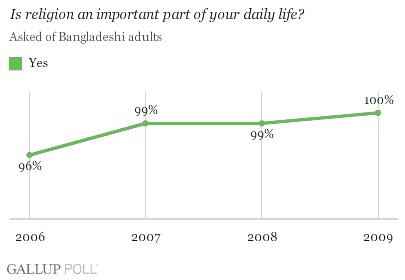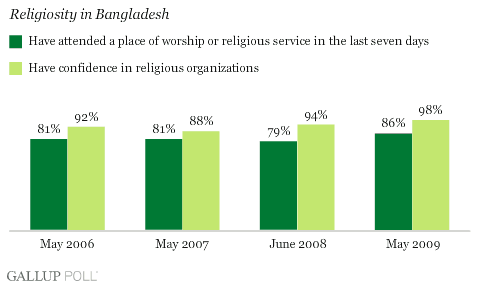WASHINGTON, D.C. -- Despite the return to power of Bangladesh's Awami League -- the political party that won in December 2008 on a platform of secularism, reform, and a suppression of radical Islamist groups -- religiosity is by no means waning in the world's seventh most populous country. A Gallup Poll of Bangladesh conducted this year finds practically all Bangladeshis saying that religion is an important part of their daily lives (100%) -- relatively unchanged from the three previous Gallup Polls of Bangladesh.

Religion has played a prominent role in Bangladesh's political history. After gaining independence from Pakistan in 1971, the Awami League founded Bangladesh under the guiding principle of secularism. However, power shifts between the Muslim Bangladesh Nationalist Party and the military throughout the 1980s and 1990s resulted in Islam being added to the constitution and declared the official state religion. Though still officially on the books today, the current government defines the country as "secular with a majority Muslim population," and not officially as a Muslim state.
It seems as though the general population is further defining the roles of politics and religion in their country by drawing a distinct line between the two. Support for the secular Awami League, according to Time magazine, is as high as it was when they won an overwhelming victory in the pivotal 1970 election that led to the war of independence from Pakistan. At the same time, religiosity remains strong in this country of nearly 90% Muslims: More people claim to have attended a religious service in 2009 than in years past, and confidence in religious organizations has increased over the years.

Simultaneous strong support of the secular Awami League and the near unanimous importance of religion in daily life suggests that while religion is vital in Bangladeshis' daily lives, they appear comfortable with its lack of influence in government.
Confidence in the current government is strong: 87% of Bangladeshis approve of the job performance of the overall leadership of the country and 88% approve specifically of the job performance of Prime Minister Sheikh Hasina. If Hasina and the Awami League can fulfill campaign promises and maintain order in what has often been a tumultuous state, there is no reason to believe that support for the ruling party will wane in the near term.
For complete data sets or custom research from the more than 150 countries Gallup continually surveys, please contact worldpollpartners@gallup.com or call 202.715.3030.
Survey Methods
Results are based on face-to-face interviews with at least 1,000 adults, aged 15 and older, conducted in May 2006, May 2007, June 2008, and May 2009 in Bangladesh. For results based on the total sample of national adults, one can say with 95% confidence that the maximum margin of sampling error ranged from a low of ±3.2 percentage points in May 2006 to a high of ±3.42 percentage points in May 2009. The margin of error reflects the influence of data weighting. In addition to sampling error, question wording and practical difficulties in conducting surveys can introduce error or bias into the findings of public opinion polls.
